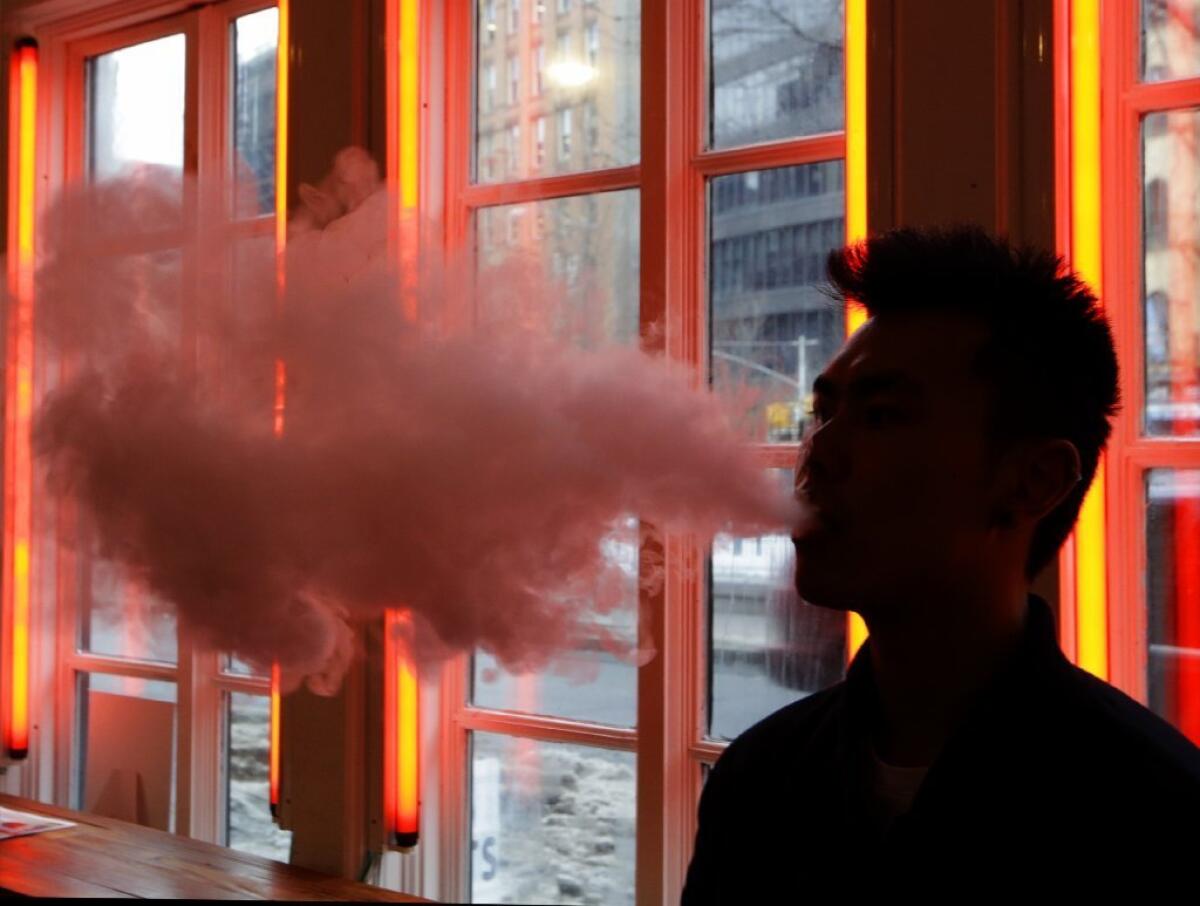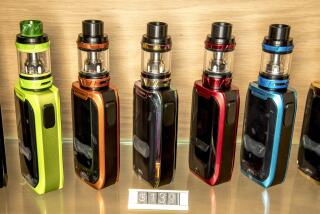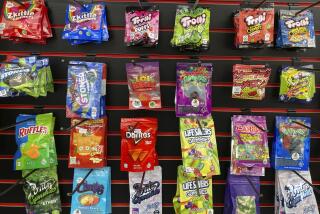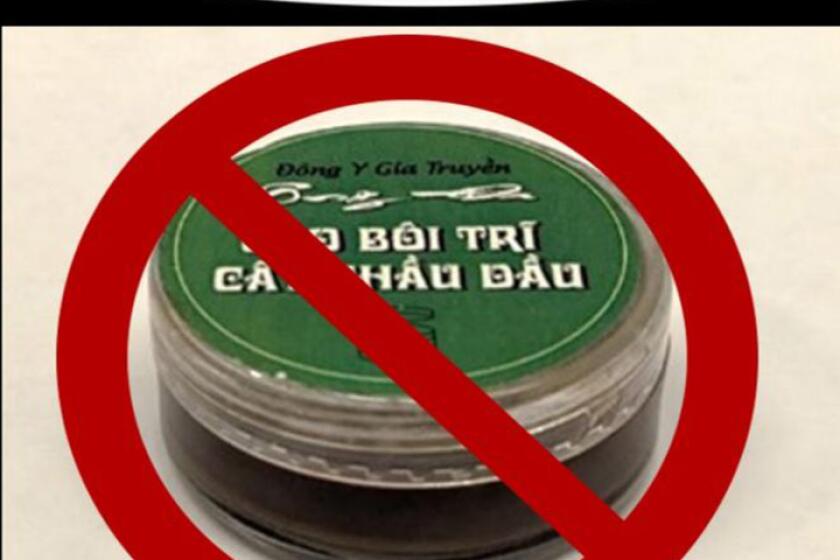Why flavored vaping products are this era’s Big Tobacco menthol cigarettes

High schoolers rallying in downtown Los Angeles this week chanted “Fight the flavor” as they showed their support for banning the flavored tobacco products that health experts say are fueling an epidemic of nicotine addiction among youths.
Among the demonstrators was Jennyfer Cortez, 16, who said she tried an e-cigarette for the first time five years ago because it tasted like blueberries, her favorite fruit. She didn’t like vaping because it made her cough, but she has seen her peers vape at their lockers, in the school bathroom and sometimes even in class.
“These kids are so addicted to nicotine, they can’t go one class period without vaping,” said Cortez, a junior at Ánimo Jackie Robinson Charter High School in South L.A.
Governments around the nation are considering banning flavored tobacco products amid burgeoning e-cigarette use among youths and a mysterious outbreak of a serious lung disease that appears to be linked to vaping. The legislative efforts would eliminate the fruity e-cigarette pods with flavors such as mango, strawberry and mint, which public health experts say are giving nicotine a foothold among youths.
Many of the regulations, including the one being considered by Los Angeles County officials that drew demonstrators to downtown L.A. on Tuesday, would also outlaw menthol cigarettes. Public health experts say the marketing and sustained popularity of menthol cigarettes provide a window into the playbook that e-cigarette companies could be using when it comes to selling flavored nicotine products.
Menthol cigarettes, which were invented in the 1920s, were promoted as healthier than regular cigarettes, despite being more dangerous, experts say.
Aggressive marketing of menthol cigarettes to African Americans worked — approximately 85% of African American smokers now prefer menthols, said Phillip Gardiner, a researcher with the University of California’s Tobacco-Related Disease Research Program.
Over the last century, attempts to ban menthols have failed, because of lobbying by the tobacco industry as well as the cigarettes’ ubiquity, experts say. The Trump administration announced a proposal last year to take them off the market, but the effort appears to have stalled.
“Menthol is the ultimate candy flavor — it helps the poison go down easier,” Gardiner said.
Youths are experimenting with flavored e-cigarettes; from 2017 to 2018, e-cigarette usage among high schoolers jumped 78%, according to the U.S. Centers for Disease Control and Prevention. E-cigarette devices work by heating a liquid cartridge containing nicotine, and perhaps an added flavor, and turning it into a vapor the user can inhale.
This month, Michigan became the first state in the nation to ban flavored e-cigarettes. The Trump administration said this month that it is also considering outlawing the products.
The concerns about flavored tobacco products mirror those about menthol cigarettes, which are flavored with a mint extract and have served as a gateway to addiction for almost a century, experts say.
“Tobacco companies have known this for a very long time…. Nicotine on its own is really bitter tasting, it does not taste good at all,” said Thomas Ylioja, a tobacco cessation expert at National Jewish Health, a research hospital in Denver. “As a former youth smoker myself, menthol was how I got started.”
Legend has it that in 1925, a man named Lloyd “Spud” Hughes placed his tobacco in a baking powder tin along with menthol crystals, which he was using to treat a cold. The next day, he rolled his tobacco and accidentally created a menthol cigarette.
Over the following decades, many companies began selling menthols, marketing them as a less harsh alternative to traditional cigarettes.
Tobacco executives noticed a slight preference for menthols among African Americans and began targeting them with advertising. Popular menthol brand Kool hired Elston Howard, an African American catcher for the New York Yankees, as a spokesman, and cigarette companies bought ads in Ebony magazine. Predictably, the percentage of black people smoking menthols skyrocketed, according to a paper Gardiner wrote detailing what he calls the “African Americanization of menthol cigarette use.”
“Unfortunately, the tobacco industry efforts have been very successful,” Gardiner said in an interview.
Menthol not only makes tobacco taste better, it also numbs the throat so people can smoke more cigarettes, he said. Worse, menthol allows for deeper inhalation of the smoke, which lets more nicotine into the body, which makes people more addicted, he said.
In 2009, a federal law outlawed many flavored cigarettes, such as chocolate and vanilla, but not menthol. The long-term success of menthols paved the way for flavored e-cigarettes, said Bill Novelli, former president of the Campaign for Tobacco-Free Kids.
“It seems pretty clear that these flavors were basically created to seduce and entice kids into smoking,” he said.
The results of a survey conducted by the American Heart Assn. of 1,500 adult e-cigarette users published this month found that nearly a third of adults who use e-cigarettes said a primary reason they started was because of the flavors. That percentage was even higher among young adults, according to the survey.
“The flavoring in these nicotine products attracts younger people at a time when they are most likely to become addicted if they try it,” said Dr. Jessica Sims with the American Heart Assn.
However, those opposed to banning flavored e-cigarettes say they offer a way for smokers to switch to a safer alternative. Experts agree that despite the risks of e-cigarettes, they remain less dangerous than traditional cigarettes.
At the rally outside the L.A. County Board of Supervisors meeting Tuesday, people shouted “Save our vapes” over the high schoolers.
Alan Ngo, 32, held a sign that said, “I Vote, I Vape.” Four years ago, he switched from smoking to vaping, the only thing that helped him quit traditional cigarettes, he said. He said his lungs feel better than they did before. He is able to run farther and he coughs less, he said.
“I think the flavors save lives,” said Ngo, who lives in Rosemead.
At the meeting Tuesday, county supervisors advanced the ban on flavored tobacco, which would make illegal not only the fruity pods of liquid nicotine and traditional menthol cigarettes, but also mint chewing tobacco and cream cigars, among other products. The ban will affect only unincorporated areas, which include about 1 million people.
Also on Tuesday, Kevin Burns, the chief executive of e-cigarette giant Juul, stepped down. His replacement, K.C. Crosthwaite, said the company would suspend all advertising in the United States and would refrain from lobbying the Trump administration on its proposed ban of flavored e-cigarette products.
In a statement, Crosthwaite acknowledged the company must work with policymakers and regulators because its “future is at risk due to unacceptable levels of youth usage and eroding public confidence in our industry.”
More to Read
Start your day right
Sign up for Essential California for news, features and recommendations from the L.A. Times and beyond in your inbox six days a week.
You may occasionally receive promotional content from the Los Angeles Times.







